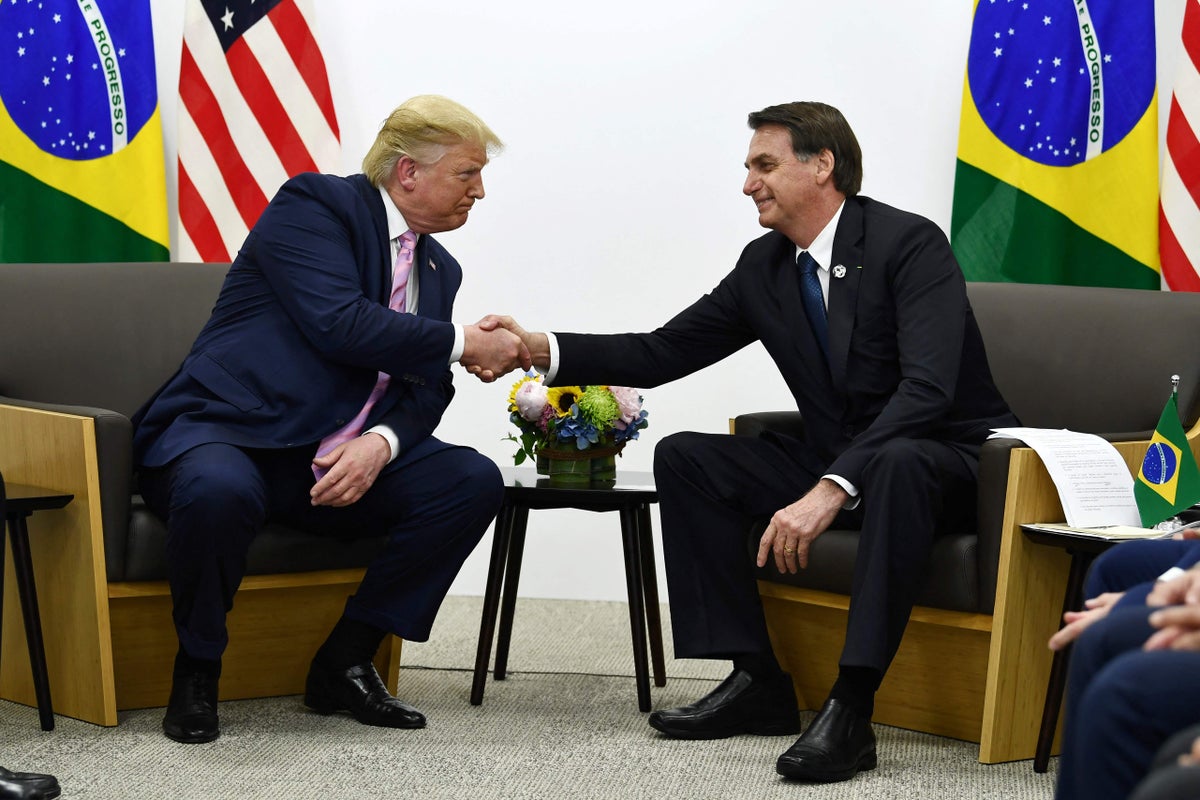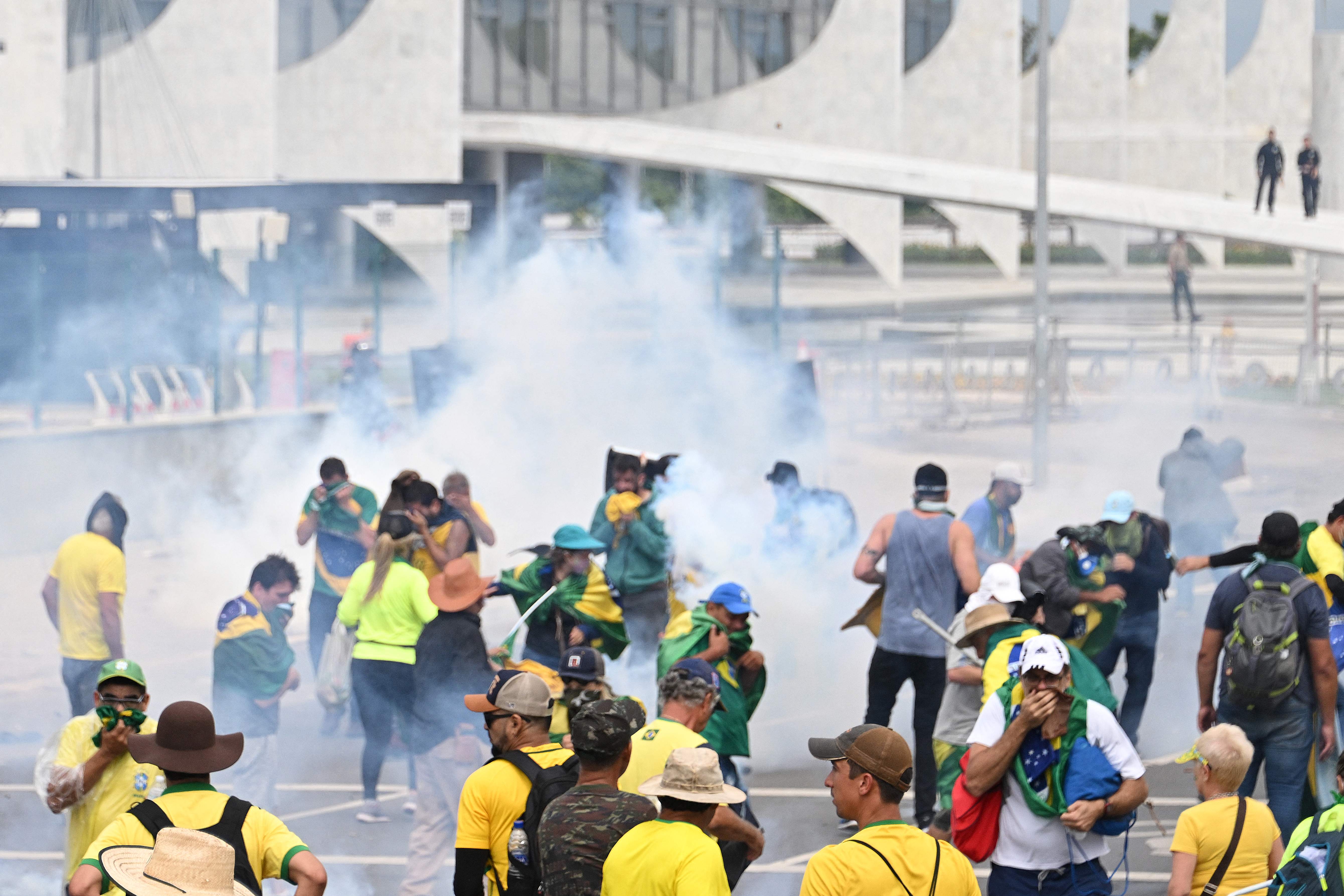
Brazil is reeling after an extraordinary day of political violence on Sunday, during which thousands of supporters of former president Jair Bolsonaro stormed the country’s Congress, Supreme Court and the presidential palace in the capital Brasilia.
Around 300 rioters were arrested over the melee, which occurred a week after the left-wing Luiz Inacio Lula da Silva – known as Lula – was sworn in as Mr Bolsonaro’s successor after defeating him in October’s presidential election.
With order since restored by security forces and the tear gas dispersed, an angry Lula has branded the would-be insurrectionists “neo-fascists” and vowed to punish them with “the full force of the law”, his denunciation echoed by other leaders around the world, from Joe Biden and Rishi Sunak to Olaf Scholz.
For his part, Mr Bolsonaro, currently holed up in Florida, has condemned the “pillaging and invasions of public buildings” but refuted as “baseless” Lula’s allegation that he is responsible for the assault on democracy, despite the conservative having repeatedly insisted the election had been stolen from him by a nationwide conspiracy and refusing to concede defeat.
“Peaceful demonstrations, in the form of the law, are part of democracy,” he tweeted. “However, depredations and invasions of public buildings as occurred today, as well as those practised by the left in 2013 and 2017, are out of the rule.
“Throughout my term of office, I have always been within the four lines of the Constitution respecting and defending laws, democracy, transparency and our sacred freedom.
“In addition, I repudiate the accusations, without evidence, attributed to me by the current head of the executive of Brazil.”
Sunday’s unsavoury scenes have inevitably invited comparison to the US Capitol riot of 6 January 2021, taking place two years and two days before, at which misguided supporters of Donald Trump laid siege to the legislative complex in Washington DC, having been similarly duped by the outgoing president’s bogus claim that the November 2020 election had been rigged against him – without his providing any evidence whatsoever and losing multiple court cases on the subject.
The events of that shameful day in American history saw violent far-right groups including the Oath Keepers, Proud Boys and believers in the QAnon cult fight with police and storm the offices of lawmakers, who fled in terror for their lives, with the aggressors vandalising the halls of Congress, threatening to take hostages and lynch vice president Mike Pence for declining to cooperate with their plot.
The sight of a makeshift gallows erected on Capitol Hill will live long in the memory.
The failed coup in Brasilia was similarly fuelled by the dishonest claims of a populist demagogue, often nicknamed “the Trump of the Tropics”, whose distortions and disinformation were amplified by the echo chambers of social media, leading to offices in the Palacio do Planalto being ransacked, windows smashed and the seat of democracy breached.
Police officers were attacked, as were journalists, with Marina Dias of The Washington Post seemingly lucky to escape without more serious injury after being pushed to the floor and assaulted by the mob.
Completing the picture, Mr Trump’s former White House chief strategist Steve Bannon wasted no time in hailing the participants as “freedom fighters” on Gettr, insisting that Lula had stolen the election.
Ali Alexander, organiser of the Stop the Steal gathering in DC, joked: “I do NOT denounce unannounced impromptu Capitol tours by the people.”
Although the parallels between the two events are clear and obvious, the pro-Bolsonaro crowd’s actions do not map as neatly onto the Trump template as one might like.
When the Republican’s brawling supporters attacked the US Capitol, it was to prevent the formal certification of the election results by a joint-session of Congress being presided over by Mr Pence several weeks before Mr Biden was inaugurated as America’s 46th president.
This time, the assault came a week after Lula had already been sworn in on New Year’s Day – a ceremony Mr Bolsonaro chose not to attend, just as Mr Trump snubbed Mr Biden’s inauguration in defiance of historical precedent and established political niceties.

The Bolsonaro supporters, wearing the yellow and green of the country’s flag and iconic national football team, were lashing out desperately after it became clear their appeals to the military to intervene and stage a coup would not bear fruit, despite many having camped outside of army bases and blocked roads for weeks on end in protest at the election outcome.
Fortunately, their behaviour has not (so far) resulted in any reported fatalities, which cannot be said of the Capitol riot, after which five people lost their lives.
Many viewing what unfolded in the Brazilian capital on social media on Sunday evening were excited by the comparison and even suggested that the protesters had their own “Q Shaman” modelled on notorious Trump supporter Jacob Angeli Chansley, who wore a bison-horned fur headdress and war paint as he stalked the corridors of power two years ago, becoming the international posterboy for political crisis in the process.
However, as BBC journalist Shayan Sardarizadeh has pointed out, his Brazilian doppelganger was actually photographed at a different rally in Sao Paolo in September 2021.
The final point of distinction with the thwarted insurrection in Washington is that Mr Bolsonaro’s denials of direct involvement are marginally more credible than Mr Trump’s, given that he was at least out of the country when the attack took place.
The American, however, had addressed the “Stop the Steal” crowd from the Ellipse just moments before they marched on the Capitol with a fiery speech in which he urged his acolytes to “fight like hell” or risk losing their country.
Tellingly, Mr Trump has so far maintained an uncharacteristic silence about events in the southern hemisphere so clearly inspired by his own disgraceful example.







